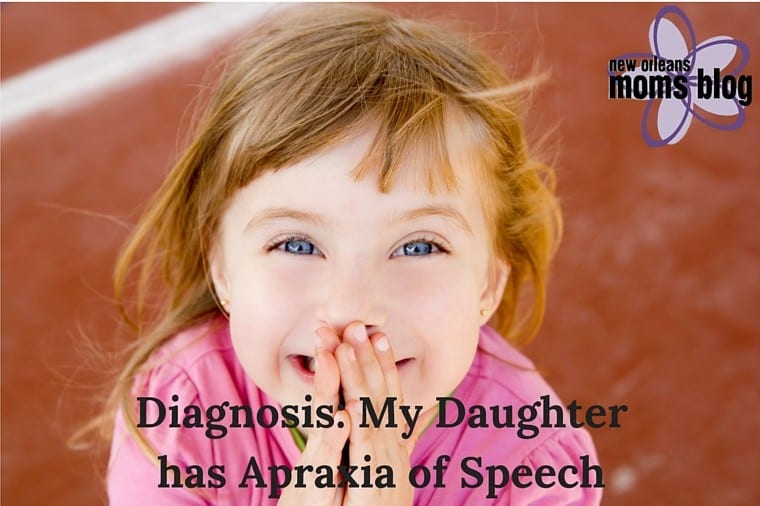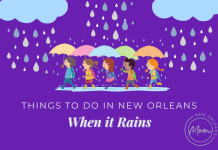Diagnosis: My Daughter Has Apraxia of Speech
According to a blog I refer to frequently, “Childhood Apraxia of Speech is a relatively uncommon speech disorder. It is a neurological disorder caused by problems with motor planning and programming of the movements necessary to produce speech … Children generally do not have problems knowing what they want to say. They can formulate the message in their mind and the muscles are capable of producing speech. The message just doesn’t travel from the brain to the mouth properly.”
If Evangeline had been given the diagnosis of childhood Apraxia of Speech at 21 months, which is when she began speech therapy, I would’ve been pretty upset. Having apraxia means a child has a slow and laborious road ahead of them to learn to speak. To think of my very sharp, perceptive child with great receptive language skills not being able to express herself with words for years to come would have been a lot to take in all at once.
Since you can’t test for apraxia until a child has a certain number of words (usually around age three), by the time we got her diagnosis we’d suspected for a while that she had apraxia and had started helping her accordingly. We had moved her to a new school with a spectacular speech therapist on staff and also found out she has sensory processing and oral motor difficulties that were certainly not helping her speech (but that’s a whole other post). Having waited so long to give an official name to her speech troubles, instead of being upset when we received the apraxia test results, I felt relief.
I need to take a moment to say that when it comes to your family’s health, as I’ve written about before on the blog, I am a huge advocate for being proactive and seeking multiple opinions. If your kid is not hitting milestones or you think something just isn’t right, follow your maternal instinct. For speech issues, ignore comments like “My niece didn’t talk until she was four but nothing was wrong with her,” or “Boys are less verbal than girls.” Seek help. Get your kid tested. If needed, get him/her into speech therapy. Even our pediatrician fell into the camp of, “Let’s wait and see. She’ll talk any day now and when she does it will be paragraphs.” For a lot of kids, that’s simply not true.
So, another change we made while waiting for E’s apraxia test was to move to a more proactive pediatrician.
How to Help
The best way to help kids with apraxia is to give them exposure; many opportunities daily to fill in a sentence or song with words or syllables; and practice practice practice. With a lot of work (speech therapy at school twice a week, plus her therapist coordinating with her teachers, and us working with her at home), we hope that in a few years, maybe by age six, E’s speech will catch up with her peers.
Terms that we’ve become familiar with are “jargoning” (talking that’s a lot of mumble jumble) and “automatic phrases” such as “I don’t know,” “Thanks Mama,” “Mine, this my Baby Gaga Bee,” (her name for her sister, Vivienne) and our favorite, “Ooooohhhhhhh, Gaga!”
While the use of sign language was very helpful early on, we eventually decided to stop teaching her additional sign language as a way to encourage more words. Instead we did binary choices, offering E either oatmeal or grits for breakfast for example. I would show her that one hand symbolizes oatmeal, the other grits, and she would either point, hold up the matching hand, or every once in a while, say the word.
Parenting a child with apraxia is plenty emotional. Having a kid who’s “different” can both play on your own insecurities and make you a stronger person. It can also change your parenting: we’re more protective of E than we’d like because we want to make sure she’s understood and that her needs are met.
Slow, Steady Progress
Just before age three, at the time of her apraxia test, E was talking at a 16-month-old level. Using a combination of words, signs, hand gestures and dramatic facial expressions, she has worked hard to communicate with us. In 2016, as she’s neared age three and a half, she has begun to speak in sentences! It’s shocking and amazing. I can understand her most of the time, though my husband has less time with her so has more trouble understanding her. She doesn’t yet get particularly frustrated when not understood, though I do see a certain funny look on her face that tears my heart.
Her most repeated phrases are the clearest: “Gaga needs pants, Mommy.” (It’s true. Her little sister is often pants-less.); “I don’t need help anymore!” and “I want you to push me high!” She just started being able to ask “Why?” and while I know that the question can be trying for all parents to answer, for the moment, it makes me so proud, and hopeful.
With each huge step, we celebrate and push on to the next.
About her apraxia diagnosis, one practitioner wrote, “Evangeline is a delightful and inquisitive child, and wise beyond her years. She shouldn’t be defined by this. There’s so much more to her.” We couldn’t agree more!

















Thank you for such an encouraging response! I myself have been one of those parents saying things like, “So and so didn’t talk until she was four and she was fine.” Never again. I will simply listen to the parents and encourage them to do what they think is best.
I’m glad my post helped you think about it differently. We always *hope* our kids are fine, don’t we?!
This post gives me hope my son will speak soon. He is 2.5 and has been officially diagnosed with alraxia because of his age but his therapist is unofficially saying he has apraxia. He has been in therapy since he was 18 months and is just starting to make progress. He is now babbling and saying certain letters and sounds. I’m just glad to know we aren’t the only ones in the area dealing with apraxia.
Hey Angelle–You’re definitely not alone. I hope you know how great it is that you put him in speech therapy so early. I’m still in shock that Evangeline is talking now (to varying degrees of comprehension on our parts, but growing better daily). I didn’t expect it to happen just yet. Being around other kids has helped Evangeline a ton, and I don’t think it’s a coincidence that when we moved her from 5 half days of school to 5 full days in January, her speech became more fluid. Best of luck to your family!
This mirrors my experience. Almost exactly. My son, whose name also starts with”E”, was diagnosed at 3 (but started speech therapy earlier), but I knew something was wrong long before. I chose to ignore the ppl around me (inc doctors!) who would tell me “boys develop speech later” “he doesn’t have to talk because his brother & sisters do it for him” “you give in when he points & grunts, force him to TELL you what he wants.” He’s 5 now & is smart as a whip. PLUS…he talks about & explains events that occurred when he couldn’t speak! You won’t regret advocating for your child. Ever.
LRA, how amazing E he talks about past events! I agree, you’ll never ever regret advocating for your kids.
Jennifer, hi; I am mom to a now-18 yo college freshman who was dx’d w/CAS at 2.5/3yo. Just want to share THE best resource of all w/you and your readers: https://www.apraxia-kids.org. There is an annual conference coming up – and if at all possible, I encourage you and anyone else parenting a child w/CAS to attend. hth!
Gloria, when did your child’s speech catch up? We use that site and have also found it to be a great resource. Thanks for commenting!
My son was also diagnosed with apraxia around age three. At age five my husband and I still could barely understand anything he said and he was a very frustrated and angry child. Now two years later with a lot of awesome speech therapy at school, he’s about to test out of therapy and friends that never realized he was even is speech are shocked to learn that about him. It may feel like a very slow process, but your child will get better! A lot of patience and love is required in the midst of it, though.
Hi Amy, I’m so glad to hear your son has made such huge progress. It’s very encouraging for our family. It’s also a testament to your family’s love that you’ve come out on the other side of the trials and tribulations of apraxia sounding strong. Best, Jennifer
Wow what a great blog!! Sounds so much like my son Holden!!!
Thanks, Leslie. How old is Holden? How’s he doing with his speech?
I could have written this word for word 🙂 My Nicholas has apraxia of speech as well. It has been a very long road as his inability to communicate often led to behavioral issues that got harder and harder to manage as he got older, but I am very pleased to tell you that we just had his year end case conference with the school (he is in community preschool 4 mornings a week and then special ed preschool 4 afternoons a week with speech once a week) and he has made tremendous progress this year. So much so that their recommendation is for a regular kindergarten class next year with speech twice a week and hopefully an in class resource to help him with transition times and other times during the day that are difficult for him. He is still not totally caught up to his peers but they estimate his speech and language skills at 5 years 4 months which is just a 2 month delay. You are doing everything you should be doing for her- just have patience and celebrate every small victory!